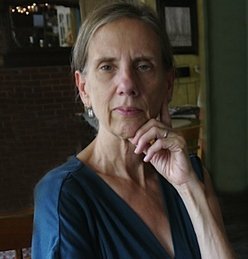 If you’re a writer looking for prompts, inspiration, or lessons on literary movements, then writers.com instructor Barbara Henning‘s new book Prompt Book (Spuyten Duyvil Publishing, 2021) is your solution.
If you’re a writer looking for prompts, inspiration, or lessons on literary movements, then writers.com instructor Barbara Henning‘s new book Prompt Book (Spuyten Duyvil Publishing, 2021) is your solution.
Naturally, we were curious about how an author goes about collecting and publishing a book of prompts. Below is our full interview with Barbara on Prompt Book and finding the inspiration to write.
Craft Interview for Prompt Book
1. What’s in Prompt Book, how is it organized, and how it will benefit the reader?
Prompt Book is a collection of writing assignments I’ve given over the years. The assignments are divided into three workshops. The first is a collection of prompts used for a workshop on writing prose poetry; these prompts include background lectures introducing students to some of the poetic movements of the 20th and early 21st centuries. The second workshop is on writing flash fiction and using some of the structures and approaches more common to poetry. And in the third workshop, the prompts are based on ideas and approaches I have used, mostly invented, to write my poetry.
I first taught the Prose Poetry course for an MA class at Long Island University in Brooklyn, the first Flash Fiction course for Naropa University and the Chronology of Mind workshop was first taught for St. Marks Poetry Project. Then I went on to develop the courses and write the lectures by teaching the material for Writers.com, as well as for LIU, Naropa, the Poet’s House in NYC and The Poetry Center in Tucson.
The book also includes an anthology of prose poems and assignments by contemporary poets whom I mostly knew through the Poetry Project. Over the years, I have often collected material and assignments from other writers to use in my classes.
The last part of the book is a collage of quotations from poets, critics and philosophers. It was my way of designing a dialogic book on poetics to understand what I was doing and to share that with students.
Barbara's Upcoming Courses:
Poetic Prose: The Prose Poem
November 13th, 2024
Explore the border between prose poetry and flash fiction. For writers of fiction, poetry, essay and memoir.
The Chronology of Mind: From Journal to Poem or Prose
June 18th, 2025
Gather material through writing and experimenting with journaling, researching and taking notes to develop into poems or prose works.
2. What was your original inspiration for Prompt Book?
I grew up in Detroit in a working-class family; the schools I attended did not teach me much about the history of poetry or literature. I remember in college being envious of some of my peers who had gone to private schools. I have always had to work hard, to research and discover what I was doing with language, and what was possible. So when I started teaching and working with students in New York City, I wanted to give them more than the prompts, but also some of the ideas and history behind these approaches. So I started making handbooks. And then when I began teaching online, I was writing the lectures. And Prompt Book just naturally evolved.
3. How did you go about writing, pitching, and publishing a book of writing prompts?
Well, I revised the assignments over and over again. The lectures in the workshops online are longer and looser with lots of links. But a book requires a different presentation. A lot of rewriting. Several years of rewriting. I didn’t really “pitch” the book. Several of my poet friends had encouraged me to put this collection together and get it published. But I didn’t want to write a book that would be a boring textbook. I wanted it to be personal, more conversational, more a part of the poetry community that I was involved with, more experiential. One day, Tod Thilleman from Spuyten Duyvil was in NYC and I showed him the manuscript; he had already published a number of my books and he wanted to publish Prompt Book, too. For me that was perfect, a publisher of poetry and fiction, not a textbook publisher. That was perhaps four, maybe five years ago. After that a lot of rewriting and work on both of our parts.
4. As you were putting together Prompt Book, how did you decide which authors and movements to pull prompts from?
In the Prose Poetry class, I was tracing back the roots of my own poetics. I was also very happy when Pierre Joris and Jerome Rothenberg published their anthology, Poems for the Millennium, Volume One. I learned a lot from their anthologies. I immediately started turning poems and ideas into prompts for student writing in an honors class I was teaching at LIU. Over the years when I would read poems, short fiction and poetics, if a story or a poem would strike me as wonderful and interesting for students, I would invent a prompt and teach it. Then the workshop prompts that helped the students write, these prompts ended up in the book.
5. Prompt Book seems to have both an inspirational and educational element. What do you want readers to learn from it?
“I hope by working with some of the prompts and sequences new writers will come to realize that they don’t have to torture themselves while waiting for inspiration.”
I hope by working with some of the prompts and sequences new writers will come to realize that they don’t have to torture themselves while waiting for inspiration. Invent an opening or a strategy and write. If you are drawn to poetry and fiction, chances are the flow of your mind is already inspired. Invent an opening and let the words flow. Then: Tinker. Revise. Analyze. Rewrite. In order to learn to love playing with phrases, lines, words, one must give up the “waiting for inspiration” and “the self-critic” and instead watch what happens with the words. I try to inspire this mindset in the book and in my classes.
I also hope that by trying some of these experiments, writers will begin to invent their own.
6. What’s one piece of advice you’d give to writers looking for inspiration?
Don’t look for inspiration. Let it flow. Read a lot. Collaborate with other writers. And write. Write journals. Write poems. Write a poem a day. Just write.
7. How do you personally find inspiration to write?
I am a yoga practitioner and a writer. Everyday I wake up and do my yoga practice. Then throughout the day, whenever possible, I work on my writing projects. Sometimes I’m putting something into the world. Sometimes I’m journaling. Sometimes I’m working on poems or a novel. It’s my way of life. It’s a way of figuring out my life, looking back and looking forward.
Find Inspiration in Prompt Book Today
Prompt Book can be found at the following booksellers:





